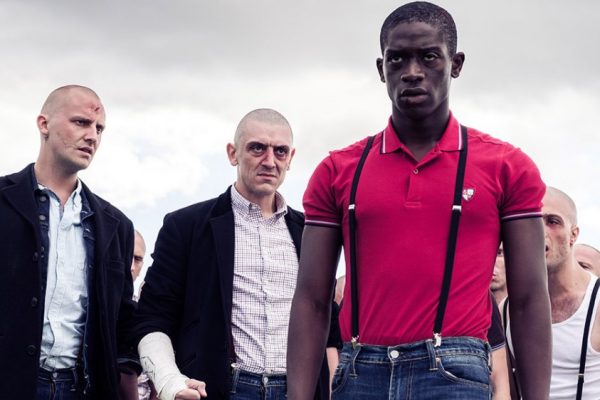In the years after World War 2, the UK saw a great influx of migrant families and couples from Africa, Jamaica and the West Indies. For various reasons, many of these families began to engage in a practice called “farming”. Whereby they would pay working class white British families to foster their children, for years at a time. Farming is the semi-autobiographical story of writer/director Adewale Akinnouye-Agbaje.
The film tells the story of “farmed” Nigerian child, Enitan. It charts his fragmentary life from near-mute, confused boy, to a misguided young criminal; failed at almost every turn by by adults in his life, and by his own self-loathing and rage. His angst and lack of supportive role-models leads him to clash with and eventually become a part of local skin-head gang, The Tilbury Skins.
There’s a clear passion behind many aspects of Farming; not least of all from Damon Idris, in his central performance as the teenage, Eni. Much of the film and it’s narrative relies on the brooding unspoken emotions that bubble up inside him. It’s a great performance, and he’s magnetic when he’s onscreen. He’s also given some solid support by Gugu Mbatha-Raw as his exasperated but enthusiastic teacher, Ms. Dapo. The other main pillar that the film rests upon is Kate Beckinsale, who plays Eni’s foster mother, the rough Essex housewife, Ingrid.
It’s clear that Akinnouye-Agbaje has a lot to say. The film feels like an exorcism of anguish aimed at the various people and situations in his life that shaped him. It’s emotive stuff, and at times is touching, shocking and engaging. The trouble is that the film’s script lacks focus and depth. The moments that surprise ought to shock, but the foundations aren’t there. There’s a sense of the story skimming through events without giving them enough weight. Early on, the film beats the audience over the head with how Eni is mute, but a few scenes later he talks, it’s almost as if it’s a plot-line that has been forgotten. Similarly other moments are quickly sketched for a payoff later that feels perfunctory rather than necessary and earned.
The film also feels like it’s desperate to make use of Beckinsale, as the biggest “name” on the roster. And while the character of Ingrid is important to the overall story, she’s as tangential to much of Eni’s story as almost every other character. The film lingers over her, and her slow realisation of her failure to properly raise Eni, but the entire story line feels tacked on and directionless. There’s a lack of cohesion to the story that hampers what could have been a far more meaningful film.
Another problem is that due to the 80s setting and the focus on skinhead gangs, it’s impossible not to make the comparison to This in England. It’s a comparison which unfortunately only highlights what a lesser film Farming is; lacking the nuance, depth and craftsmanship. Akinnouye-Agbaje’s hand at the tiller of this ship isn’t quite as firm as it could be, and some of the early scenes with child actors performing are particularly awkward.
That said, it’s far from a bad film. The adult cast, as mentioned, are universally excellent. Even minor roles, such as Jamie Winstone‘s turn as an amorous hanger-on, John Dagleish as the Tilbury Skins leader, Levi, and an almost unrecognisable Cosmo Jarvis, as a member of the gang. It’s a story that sheds light onto a not widely known aspect of British social history, and tells a story of redemptive growth that is worth hearing.
At Edinburgh Filmhouse from Thu Oct 11 2019
